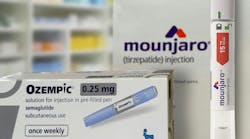Approximately 70% of adults in the US struggle with obesity or are overweight,1 which has prompted a surge in prescriptions for weight-loss drugs. Originally developed for the treatment of type 2 diabetes, semaglutide—known under the brand names Ozempic, Rybelsus, and Wegovy—has exploded in popularity over the past few years for its dual role in targeting obesity and elevated blood sugar. In late 2023, the FDA added another tool to the weight-loss arsenal when they approved tirzepatide—known under the brand names Mounjaro and Zepbound—for chronic weight management.1
During the last three months of 2022, health-care providers wrote more than 9 million prescriptions for weight-loss drugs.2 The number of prescriptions for semaglutide rose 150% over the past year, marking an 80% increase in written prescriptions per health-care provider.3 Since insurance coverage for weight-loss drugs isn’t a given,4 many people are paying for these drugs out-of-pocket.
Weight-loss drugs can have dental implications and point to systemic health issues. If your patients are taking any of these medications, you may need to adjust dosages of local anesthetics and analgesics or make other considerations regarding your dental treatment.5
DentistryIQ and its sister publication, Perio-Implant Advisory, have published several articles on Ozempic and other weight-loss drugs in recent months. Here’s what dental clinicians need to know.
What is Ozempic and how does it work?
Has Ozempic become the most popular drug in dentistry? Learn more about Ozempic’s mechanism of action, why it must be administered subcutaneously, and why diabetics are having such a hard time getting the drug filled.
Dental considerations for people taking Ozempic
Does Ozempic affect dental care? Yes, and it has some surprising implications in dentistry.
How are all the weight-loss drugs different?
Both semaglutide and tirzepatide started out as medications to treat type 2 diabetes, but there are notable differences. Learn more about Ozempic, Wegovy, Mounjaro, and Zepbound.
Ozempic and halitosis
One lesser-known side effect of Ozempic is halitosis. Bad breath affects approximately 35% of people worldwide and 80 million people in the US.6 How does Ozempic contribute to bad breath?
Ozempic and sedation dentistry
Reports of food regurgitation and aspiration during procedures involving general and deep sedation prompted the American Society of Anesthesiologists to release new guidance7 that recommends withholding drugs like Ozempic ahead of elective procedures or surgeries.
Editor’s note: This article first appeared in Clinical Insights newsletter, a publication of the Endeavor Business Media Dental Group. Read more articles and subscribe.
References
- FDA approves new medication for chronic weight management. US Food and Drug Administration. November 8, 2023. Accessed February 15, 2024. https://www.fda.gov/news-events/press-announcements/fda-approves-new-medication-chronic-weight-management
- Constantino AK. Ozempic, Wegovy drug prescriptions hit 9 million, surge 300% in under three years. CNBC. September 27, 2023. Accessed February 15, 2024. https://www.cnbc.com/2023/09/27/ozempic-wegovy-drug-prescriptions-hit-9-million.html
- Tucker ME. Semaglutide prescribing surged in the past year. Medscape. November 1, 2023. Accessed February 15, 2024. https://www.medscape.com/viewarticle/997956
- Does insurance cover weight loss medication? Obesity Medicine Association. December 18, 2023. Accessed February 15, 2024. https://obesitymedicine.org/blog/does-insurance-cover-weight-loss-medication/
- Maragliano-Muniz P, Viola T. Dental considerations for people taking Ozempic. DentistryIQ. September 21, 2023. Accessed February 16, 2024. https://www.dentistryiq.com/dentistry/pharmacology/video/14299247/dental-considerations-for-people-taking-ozempic
- Bad breath statistics. Bad Breath Institute. Accessed February 15, 2024. https://xbadbreath.com/bad-breath-info/statistics/
- Joshi GP, Abdelmalak BB, Weigel WA, et al. American Society of Anesthesiologists consensus-based guidance on preoperative management of patients (adults and children) on glucagon-like peptide-1 (GLP-1) receptor agonists. American Society of Anesthesiologists. June 29, 2023. Accessed February 15, 2024. https://www.asahq.org/about-asa/newsroom/news-releases/2023/06/american-society-of-anesthesiologists-consensus-based-guidance-on-preoperative
Vicki Cheeseman is an associate editor in Endeavor Business Media's Dental Group. She edits for Dental Economics, RDH, Perio-Implant Advisory, DentistryIQ, and Clinical Insights.








